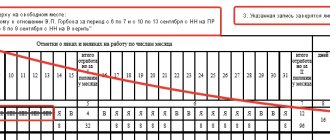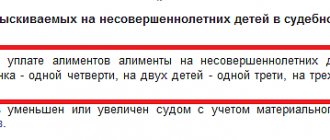Home / Alimony / Is it possible to apply for alimony retroactively?
It is not uncommon for divorcing parents to agree to share child support. Having reached an oral agreement, it seems unnecessary for parents to sign written documents or, even more so, to go to the courts and executive services.
However, verbal agreements are not always implemented. In the best case, financial support is still provided, but over time it becomes less and less frequent, in smaller amounts, until it stops completely. In the worst cases, verbal agreements are simply ignored, and monetary assistance cannot be achieved.
In the end, you have to resort to the services of judicial and executive authorities to recover money from the children. The question arises: is it possible to apply for alimony “retroactively” and receive amounts of money for the past?
How to collect alimony “retroactively”?
According to the provisions of the Family Code, you can apply for alimony at any time - not only immediately after a divorce or after some time, but even without reference to marriage or divorce. Both parents are required to support the child, regardless of whether they are married or divorced (Article 80 of the RF IC).
In most cases, the collection of alimony begins from the moment you go to court . Is it possible to claim amounts of money for a previous period when they should have been paid, but were not paid or were not paid in full?
According to Article 107 of the Family Code, amounts of money can indeed be claimed for the past - for three years . However, there must be a good reason for this. It is as follows: before going to court, the necessary measures were taken to obtain sums of money, but were not received due to the obligor’s evasion of payment .
Of course, it is not enough to simply state unfoundedly at a court hearing that attempts were made to obtain payment of money, but were not crowned with success. It will be necessary to present to the court convincing evidence of the payer’s evasion from fulfilling alimony obligations. Suitable evidence includes witness statements, telephone conversation records, video recordings, personal correspondence (letters, emails, SMS.
Expert opinion
Semyon Frolov
Lawyer. 7 years of experience. Specialization: family, inheritance, housing law.
From this we can draw the following conclusion: if a parent does not go to court, he should not seek child support payments on his own. And only if the payer categorically refuses to provide any financial support, in court it is possible to obtain funds for the past period (within the last three years).
If the payer helped the family in the slightest degree, he can provide the court with evidence of this - checks and purchase receipts, witness statements, alimony will most likely be assigned from the moment the claim is filed.
Features of alimony issued retroactively
How to collect alimony “retroactively”?
- Proof. To receive retroactive alimony, you must file a claim in court. In court, you must prove that you made attempts to obtain child support from the second parent, but he evaded the obligation to pay it.
How much alimony can be collected retroactively?
- Amount and period. It is possible to recover a “round” amount, since alimony can be recovered within a three-year period from the date of going to court.
How to apply for child support “retroactively”?
To request retroactive child support, a parent must file a lawsuit in court to collect child support. The statement of claim must focus on the fact that recently the parent, despite demands for joint maintenance of the children, has not paid money.
The following documents must be attached to the statement of claim:
- Plaintiff's passport;
- Birth certificates of minor children;
- An extract from the house register - confirmation of the fact that the children live with the plaintiff parent;
- Certificates of income of the plaintiff and defendant;
- Documentary evidence that child support was requested but not paid by the respondent parent (bank statements, witness statements, telephone records, emails or text messages).
Based on the outcome of the consideration of the claim, the court will decide whether alimony will be assigned from the moment the application to the court is made or whether the past period of non-payment will be taken into account (within three years).
How to collect alimony for previous years
In order to claim a debt for alimony obligations, you must:
- collect a package of documents*;
- come to the court at the place of registration;
- pay the state fee;
- file an application for alimony;
- appear at the meeting.
*Lawyers should be consulted.
Collection of evidence of non-payment of alimony
Verbal statements that the defendant did not have and does not have the desire to help support the child will not be able to convince the court to rule on the case in favor of the plaintiff. Refusal to pay alimony must be recorded and provided in the form:
- messages (SMS, correspondence on social networks, instant messengers, email, notes, notifications, etc.);
- video and audio recordings;
- testimony.
You can also attach statements from all of the plaintiff’s accounts, which will indicate that no (or insufficient) money transfers were made on behalf of the second parent.
Filing a claim for retroactive alimony collection
The statement of claim does not have a strictly established form, but its text must include:
- data of the judicial authority, plaintiff, defendant and child;
- status of official relations between the parties to the case;
- requirements* of the applicant and legal grounds (regulatory acts) for their satisfaction.
*Indicating the fact of evasion of alimony payments
Documents for download (free)
- Statement of claim for the recovery of alimony for 1 child
- Statement of claim for the recovery of alimony for 2 children
- Statement of claim for the recovery of alimony for 3 or more children
- Claim for alimony
If there is evidence, you must provide information about the persons who provide it.
The claim must be supplemented with documents according to the list:
- plaintiff's passport;
- child's birth certificate;
- certificate;
- an extract from the house register (to officially confirm the child’s residence with the plaintiff);
- certificate of income of both parties in form 2-or 3-NDFL depending on the type of their activity;
- receipt of payment of state duty.
This list may be changed depending on the details of the case.
You also need to attach evidence of the agreement concluded between the parents on regular financial assistance to the child (messages, video and audio recordings, witness statements, receipts, etc.) and its non-compliance.
IMPORTANT! If the non-custodial parent provided financial support, but it was less than the agreed amount, the plaintiff may also request the difference.
State duty
Administrative cases within the framework of the Family Code of the Russian Federation related to children are considered free of charge. If the essence of the claim is of a material nature, then it is necessary to pay a state fee. But this obligation will fall on the shoulders of the defendant if the plaintiff wins the case. He will have to pay 300 rubles for consideration of the case to collect alimony retroactively.
Adoption of a judicial decision
The case is decided by a judge, which can take up to 30 days. The result of the process will be the issuance of a writ of execution, which must be submitted to the FSSP. Next, the bailiffs will begin collecting the debt. This could be the seizure of bank accounts, property (followed by evaluation and sale at auction) or the transfer of a document to the defendant’s work organization, after which part of his monthly salary will be deducted in favor of the applicant.
Calculation of alimony for the past period
Alimony can be paid in two forms:
- as a percentage of earnings (one child - 25%, two - 33%, three - 50%);
- in a fixed amount.
If the parent has a regular income, alimony is assigned as a percentage of earnings - the calculation will be based on information about earnings for the last three years , from which the required percentage of alimony will be calculated.
If the parent does not have a regular income, alimony will be assigned in a fixed amount based on the minimum wage, taking into account indexation for the previous period.
Practical advice
So, the law allows for alimony requests “ retrospectively” - for the previous three years. However, this requires strong evidence of persistent non-payment of funds despite legal demands.
Expert opinion
Dmitry Nosikov
Lawyer. Specialization: family and housing law.
What advice can you give to a parent who, after a divorce, “takes his word for it”?
- Put words on paper. It is not necessary to immediately go to court; you can draw up a written agreement, which, when notarized, will be equal to a writ of execution. If in the future there are discrepancies between the parent's promises and actions, a written document can achieve more than persuasion and threats.
- Attempts to obtain alimony from a parent and his refusal to pay must also be recorded in writing, so that documentary evidence can later be presented in court.
For the sake of fairness, something must also be said about the responsible parents, who often find themselves in an unpleasant situation. If over the past time they have provided financial support to the family (they bought clothes and shoes for the children themselves, paid for children’s vacation trips, transferred money directly to the mother), but cannot provide evidence of this - no receipts, no checks or receipts, no testimonies of friends or relatives. You can recommend that they make money transfers to a bank account while keeping the receipt, or hand it over and receive a receipt, and also keep receipts for purchases. Even SMS or emails can also serve as evidence in court if they contain information about providing financial support to the family (see “How to prove that you paid alimony?”)
Rubric “Question/Answer”
I haven’t filed for alimony for 2 years, and now I’ve decided to go to court. Can I demand alimony for the specified period?
Expert opinion
Semyon Frolov
Lawyer. 7 years of experience. Specialization: family, inheritance, housing law.
No, such a demand cannot be made. The court will require you to provide a document providing the basis for collecting alimony - an agreement with your ex-husband or a court writ of execution. There is no such evidence, which means it will not be possible to collect alimony for the past 2 years . Even to claim alimony for the past period, evidence is needed. Without them, it is impossible to formalize payments “retroactively” (see “From what moment is alimony calculated”).
I am going to file a claim for alimony for the previous three years. A question arose about the state duty. Tell me, do I need to pay for it and what size?
Expert opinion
Dmitry Nosikov
Lawyer. Specialization: family and housing law.
If the plaintiff intends to collect alimony from the defendant, there is no need to pay a state fee. The obligation is assigned to the opposite party - the future alimony payer (Clause 1, Article 103 of the Code of Civil Procedure of the Russian Federation). If you need to collect alimony for one child, the state fee is 150 rubles. If the mother also claims her own support, the amount is already 300 rubles. However, if the court refuses to satisfy the demands for alimony for the mother, the plaintiff will have to pay 150 rubles. The availability of exemption from payment of state duty must be indicated in the text of the statement of claim.
Hello! My son is 16 years old, I help as much as I can, but his mother is afraid that she will file for child support for 16 years. I also have children from another marriage - one-year-old twins. I'm afraid they'll take away my car - in fact, this is my only source of income. What to do?
Expert opinion
Semyon Frolov
Lawyer. 7 years of experience. Specialization: family, inheritance, housing law.
The fears are in vain. The mother will be able to apply for child support “retroactively” only if there is evidence of non-payment on your part. Apparently, there was targeted assistance, you did not refuse to support your son, you voluntarily and regularly paid for his expenses. Therefore, the mother will need to prove in court that she made attempts to collect alimony from you , but there was none (clause 2 of Article 107 of the RF IC). Most likely she will not have such arguments. It’s good if you still have checks or receipts that confirm real help to your son. They can be used as your defense (in case the case goes to court). Usually this is enough.
Even if the mother files for alimony, they will begin to collect it from the moment the child goes to court - the son is already 16 years old at this time. The maximum that you will be awarded is to pay alimony for the remaining 2 years. Once the child reaches adulthood, child support obligations are removed. The risk of the car being seized is low. Of course, if alimony is paid on time and without arrears. Again, only if the court obliges you to pay them.
What you need to know so that alimony is not collected from you retroactively.
Sometimes conflicts between spouses lead to protracted litigation on various issues.
If initially there was an oral agreement on the payment of financial assistance for the maintenance of a minor, and then the other party changed its mind and filed a statement of claim, then evidence should be prepared that alimony has been paid all this time.
Therefore, fathers are recommended to transfer funds by bank transfer or require a receipt for receipt of money from their ex-wife.
At the court hearing, evidence that the duties were fulfilled will be receipts, checks, bank statements, etc.
The collection of alimony for previous years can also be canceled in cases where the defendant had a difficult financial situation for good reasons:
- illness;
- loss of ability to work;
- lack of work;
- non-payment of wages by the employer, etc.
Family law primarily protects the rights and interests of minors.
Both parents are obliged to support the child equally, even if they live separately. If one of them evades financial assistance, then it should be demanded through the court.
Results
- If the father did not pay child support and the mother did not take any action to obtain funds, she has the right to recover child support payments in court. Accruals will begin from the moment the claim is filed.
- If the mother tried to obtain financial support for the child, but the father did not answer calls and messages, hid, refused to pay money or help in any other way, she can demand child support “retroactively” - for the past three years. To do this, you need to present to the court evidence of the above circumstances.
- Both parents may be advised to retain any evidence of payment or non-payment of monies to present as conclusive evidence in court proceedings.
Alimony legal relations are very confusing. Even if the spouses come to an agreement, disagreements and resentments may arise in the future. Well, if we talk about the collection of alimony “retroactively” - for the last three years, the situation is even more complicated. The mother will have to prove that she sought voluntary payments from her father in every possible way. The father will have to justify the maintenance of the children - in case the mother wants to claim alimony for the past period. It is more difficult for those who have children from a second marriage, who have lost their jobs or live far from their family. All situations require individual analysis. Lawyers on our website are ready to provide initial advice on alimony. If you have any questions, ask them to a lawyer - he will give a clear, relevant and timely comment. You don’t have to get into the jungle of legislation and make mistakes. The lawyer will tell you what to do, what can be done and how high the chances of success are!
Watch the video about when and who can apply for alimony “retroactively”:
Attention!
- Due to frequent changes in legislation, information sometimes becomes outdated faster than we can update it on the website.
- All cases are very individual and depend on many factors. Basic information does not guarantee a solution to your specific problems.
That's why FREE expert consultants work for you around the clock!
- via the form (below), or via online chat
- Call the hotline:
- Moscow and the Region
- St. Petersburg and region
- FREE for a lawyer!
By submitting data you agree to the Consent to PD Processing, PD Processing Policy and User Agreement.
Anonymously
Information about you will not be disclosed
Fast
Fill out the form and a lawyer will contact you within 5 minutes
Tell your friends
Rate ( 1 ratings, average: 5.00 out of 5)
Author of the article
Irina Garmash
Family law consultant.
Author's rating
Articles written
612
The process of reviewing cases of filing an application for retroactive alimony
It is not enough to simply state that the payer evaded his obligation.
It is important to convince the court that attempts were made to collect payments on a voluntary basis, but they did not produce any results.
In the event that the court considers the applicant’s arguments weak, alimony will be assigned only from the date of filing the claim.
The following can be presented as evidence:
- witness statements;
- recordings of telephone conversations;
- video recordings of meetings and negotiations about alimony;
- correspondence, including SMS, printing of letters from email, dialogues from social networks.
If the applicant has not applied to the court before, then initially it is necessary to try to obtain financial support on his own. This is the only way to collect alimony retroactively.
It is important to consider that if the ex-spouse transferred even the most minimal amounts or bought the child the funds necessary for subsistence, which he can confirm with checks, then alimony will be accrued from the moment the claim is filed.
Some dads who abandoned their family are trying to delay the process by demanding confirmation of relationship.
In this case, you need to prepare for the fact that you will have to attend more than one court hearing and conduct a genetic examination.
If you want to speed up this procedure, you can do a DNA test at your own expense, and collect the money for it along with alimony.
Such actions will be appropriate only if the payer has a confirmed income. Otherwise, you will have to wait a long time for money.









